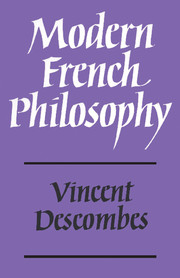Book contents
- Frontmatter
- Contents
- Foreword by Alan Montefiore
- Note on abbreviations and translation
- Introduction: Philosophy in France
- 1 The humanisation of nothingness (Kojève)
- 2 The human origin of truth (Merleau-Ponty)
- 3 Semiology
- 4 The critique of history (Foucault, Althusser)
- 5 Difference (Derrida, Deleuze)
- 6 The end of time (Deleuze, Klossowski, Lyotard)
- Index
4 - The critique of history (Foucault, Althusser)
Published online by Cambridge University Press: 05 June 2012
- Frontmatter
- Contents
- Foreword by Alan Montefiore
- Note on abbreviations and translation
- Introduction: Philosophy in France
- 1 The humanisation of nothingness (Kojève)
- 2 The human origin of truth (Merleau-Ponty)
- 3 Semiology
- 4 The critique of history (Foucault, Althusser)
- 5 Difference (Derrida, Deleuze)
- 6 The end of time (Deleuze, Klossowski, Lyotard)
- Index
Summary
History is the western myth.
Such a statement clearly implies a critique of history. This critique, however, does not consist in denying that there is history, contrary to the charge brought by Sartre against the structuralists. Speaking of Michel Foucault's (highly successful) book, Les mots et les choses (The Order of Things), Sartre says:
Foucault supplies people with what they have been needing: an eclectic synthesis in which Robbe-Grillet, structuralism, linguistics, Lacan and Tel Quel are each invoked in turn so as to demonstrate the impossibility of historical thought.
Behind history, of course, the target is Marxism. This is an attempt to constitute a new ideology, the last bulwark which the bourgeoisie can still erect against Marx.
The Order of Things, ‘last bulwark’ raised by the ‘bourgeoisie’ against ‘Marx’ … Unfortunately for Sartre, his judgment here is a strikingly clear testimony to the mythical nature of his conception of history. Nobody seeks to ‘deny history’. Our only concern is to ascertain whether a sober conception of it may be reached after the twilight of the Hegelian idol.
Nihilism
Like several philosophers of his generation, Foucault comes from the French positivist school, for whom philosophy is a function of the history of concepts at work in the various learned specialist fields. Having set out to write a history of psychiatry, i.e. a study of the distinction made by doctors between the normal and the pathological in the field of mental health, Foucault finishes by writing his Histoire de la folie à l'âge classique.
- Type
- Chapter
- Information
- Modern French Philosophy , pp. 110 - 135Publisher: Cambridge University PressPrint publication year: 1981

